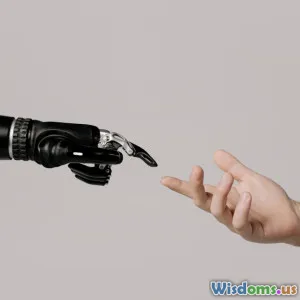
The Future of Work: Sci Fi Influence
7 min read Exploring how science fiction shapes our visions of future work environments and technologies. (0 Reviews)
The Future of Work: Sci Fi Influence
As we stand on the brink of a new era defined by rapid technological advancements, the way we work is undergoing significant transformation. One of the most fascinating aspects of this evolution is the influence of science fiction (sci-fi) on our perceptions of the future workplace. From artificial intelligence and robotics to virtual reality and telecommuting, sci-fi has not only entertained but also inspired real-world innovations. This article delves into how sci-fi shapes our understanding of the future of work, providing insights into what we might expect in the coming years.
The Role of Science Fiction in Shaping Work Culture
Science fiction has always been a mirror reflecting society's hopes and fears about the future. It allows us to explore potential advancements and the implications of those advancements on our lives, including our professional environments. Popular sci-fi works like Isaac Asimov’s robot stories and Philip K. Dick’s visions of artificial intelligence have made us think critically about the role of machines in our daily tasks.
For example, Asimov's Three Laws of Robotics have sparked discussions about ethical programming in AI, which is vital as we integrate more advanced technologies into workplaces. This kind of speculative thinking encourages developers, business leaders, and policymakers to consider the ethical implications of their innovations.
AI and Automation: A Double-Edged Sword
One of the most pervasive themes in sci-fi is automation and its impact on employment. Works like “Blade Runner” and “The Matrix” depict futures where human roles are diminished by machines. While these narratives can be dystopian, they also serve as warnings about the need for balance in integrating AI into the workforce.
Real-world examples, such as the rise of chatbots in customer service and automated manufacturing, show us that AI can enhance productivity but also lead to job displacement. This duality emphasizes the importance of reskilling and upskilling the workforce to adapt to new roles created by technological progress.
Remote Work and Virtual Reality: A Sci-Fi Vision Realized
The COVID-19 pandemic accelerated the shift towards remote work, a concept that sci-fi has explored for decades. Films like “Ready Player One” envision immersive virtual environments where people can work and socialize. Today, tools such as virtual reality (VR) and augmented reality (AR) are beginning to make this vision a reality. Companies are experimenting with VR meeting rooms and collaborative platforms that transcend geographical boundaries.
This shift not only changes where we work but also how we interact as teams. The future workplace may incorporate more flexible scheduling and asynchronous communication, allowing employees to better balance their work and personal lives.
The Gig Economy: A New Work Paradigm
Science fiction often explores themes of non-traditional work structures. The rise of the gig economy mirrors these narratives, where individuals engage in short-term contracts or freelance work instead of traditional employment. Shows like “Black Mirror” highlight the complexities of gig work, including job insecurity and the lack of benefits.
As technology facilitates remote work and digital marketplaces, more people are choosing flexible work arrangements. This trend raises questions about workers’ rights and the necessity for regulations to ensure fair treatment in an increasingly fragmented labor market.
Skills for the Future: What Sci-Fi Teaches Us
As we look toward the future, it is essential to focus on the skills that will be necessary to thrive in an evolving workplace. Sci-fi often emphasizes adaptability and continuous learning as critical traits for survival. For instance, characters in “The Expanse” adapt to new technologies and environments, showcasing the importance of being versatile and open to change.
To prepare for the future, employees will need to cultivate skills like critical thinking, creativity, and emotional intelligence—qualities that machines cannot replicate. Lifelong learning will become the norm, with educational institutions adapting to provide relevant training and reskilling opportunities.
Conclusion
The influence of science fiction on the future of work is profound and multifaceted. It compels us to imagine possibilities and confront challenges as we integrate technology into our professional lives. As we embrace innovations like AI, remote work, and the gig economy, we must also consider the ethical implications and prioritize the welfare of the workforce. By looking to sci-fi as both inspiration and cautionary tale, we can navigate the future of work with a more informed and thoughtful perspective, preparing ourselves for the opportunities and challenges that lie ahead.
In conclusion, the lessons drawn from science fiction can guide us in ensuring that the future of work is not only innovative but also equitable and enriching for all.
Rate the Post
User Reviews
Popular Posts





















